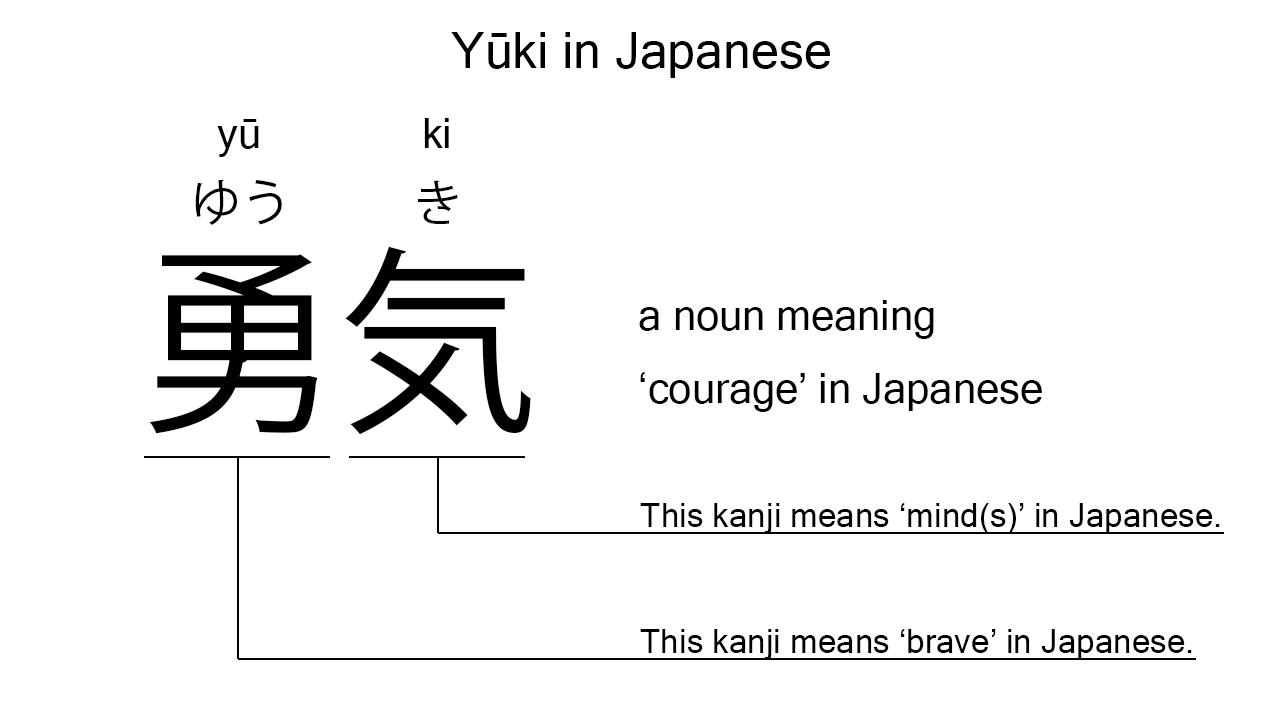How to say “courage” in Japanese
Native speakers say “yūki” often to mean ‘courage’ in Japanese. Perhaps, some Japanese learners know this word as it is sometimes used in Japanese movies, songs, novels, manga, anime, and the like. In this blog post, however, I will explain this word in detail based on its kanji expression. And also, I will explain how to use it through example sentences. My explanations would help Japanese learners understand “yūki” more clearly. Then, let’s get started!
Contents
Definition and meanings of “yūki”
Let me start with the definition and meanings of “yūki”.
- yūki – 勇気 (ゆうき) : a noun meaning ‘courage’ in Japanese. Depending on the context and situation, this can also mean ‘bravery’ in Japanese.
The definition and meanings are simple and clear. To understand this noun more clearly, however, let me explain its kanji characters in detail, one by one.
Kanji for courage
The kanji expression of “yūki” consists of the following two kanji characters:
- 勇 : a kanji character used to mean ‘brave’ in Japanese.
- 気 : a kanji character used to mean ‘mood’, ‘mind’, ‘feeling’, ‘heart’, or such in Japanese.
These two kanji characters tell us that the formed noun literally means a ‘brave mind’ in Japanese. This literal interpretation is very close to the actual meanings, I think.

When we meet new kanji expressions, we should check their kanji characters in detail to understand their meanings clearly and deeply. In many cases, kanji characters tell us a lot about the meanings of the expressions they form. Actually, here, we could get the better understanding of “yūki” through the detailed kanji check above.
So far, I’ve explained the definition and meanings of “yūki” together with its kanji characters. Then, let me explain how to use it through the example sentences below.
Example #1: how to say “courage” in Japanese
watashi wa anata no yūki ni kansha shi masu – 私はあなたの勇気に感謝します (わたしはあなたのゆうきにかんしゃします)
I appreciate your courage.
Below are the new words used in the example sentence.
- watashi – 私 (わたし) : a pronoun meaning ‘I’ in Japanese.
- wa – は : a binding particle working as a case marker or topic marker. In the example, this works after “watashi” to make the subject in the sentence.
- anata – あなた : a pronoun meaning ‘you’ in Japanese.
- no – の : a case particle used after a noun or pronoun to make its possessive case. In the example, this is used after “anata” to make its possessive case, “anata no”, which means ‘your’ in Japanese.
- ni – に : a case particle used to say in which direction an actin goes. In the example, this is used after “anata no yūki” to indicate the object to which the action described by “kansha shi masu” is directed.
- kansha shi – 感謝し (かんしゃし) : one conjugation of the verb, “kansha suru”, which means ‘to appreciate’ in Japanese. In the example, it has been conjugated for the better connection with its following word.
- masu – ます : an auxiliary verb used after a verb to make it polite. Probably, this is well known as a part of Japanese masu form. In the example, this is used after “kansha shi” to make it sound polite.
This is a typical usage of “yūki”. In this example, it works together with the possessive case, “anata no”, to mean ‘your courage’ in Japanese. When we want say “courage” in Japanese, anyway, this noun is a very good option.
Example #2: another usage of “yūki”
boku wa yūki ga nai – 僕は勇気が無い (ぼくはゆうきがない)
I’m not brave.
Below are the new words used in the example sentence.
- boku – 僕 (ぼく) : a pronoun meaning ‘I’ in Japanese.
- ga – が : a case particle used to make the subject word or the object word in a sentence. In the example, this is used after “yūki” to make the subject in the sentence.
- nai – ない : an i-adjective used to say that something does not exist in Japanese. In the example, this is used to deny the existence of courage.
This is another typical usage of “yūki”. In this example, it works as a part of the commonly-used phrase, “yūki ga nai”, which literally means “courage doesn’t exist” or “there is no courage” in Japanese. So, the original meaning of the Japanese sentence is more like “for me, there is no courage”. In many cases, however, its meaning is understood as ‘not brave’.
Summary
In this blog post, I’ve explained the definition and meanings of “yūki” in detail based on its kanji expression. And also, I’ve explained how to use it through the example sentences. Let me summarize them as follows.
- yūki – 勇気 (ゆうき) : a noun meaning ‘courage’ in Japanese. Depending on the context and situation, this can also mean ‘bravery’ in Japanese. These two kanji characters literally mean a ‘brave mind’ in Japanese. This literal interpretation is very close to the actual meanings, I think.
Hope my explanations are understandable and helpful for Japanese learners.